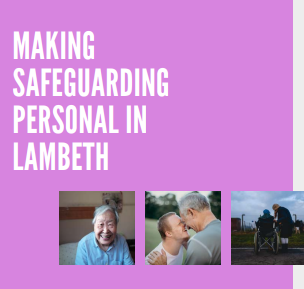Making Safeguarding Personal is at the heart of the Board’s ethos, and key to this is hearing from people with lived experience. As part of this objective, Lambeth Adult Social Care works with Healthwatch Lambeth to regularly seek feedback from people who have been through the adult safeguarding process.
The Community Reference Group also undertook a project in 2020 to find out what adult safeguarding means to people, using a combination of online survey and telephone interviews – you can read about what people told us here.
We used this feedback to reflect on what simple things we can do in practice to facilitate person centred working. How would you respond to the following scenarios?
What happened
How this made me feel
What could the professional have said or done to help those involved in the safeguarding enquiry?
James lives at home with his wife Susan, who is his main carer. James has limited mobility and needs support to reposition himself. Following an admission to hospital after James has a fall, there are concerns that Susan is not following correct procedures for manual handling, and that this could be causing harm to James
“I would feel hurt that I was being blamed for not looking after my husband properly”
It is important to take time to listen to both Susan and James in order to understand the reasons Susan is not following correct procedures and to find out how you can help.
Think about how to frame this without using negative language.
For example, could you say ‘Let me show you another way’ or offer to practice together.
Can we work together to help you support your husband in a way that is safe for you both?
We are not blaming you- we want to help keep you both safe from injury
Maria is 84 and lives alone. She has hearing loss and mobility difficulties. She told her home care worker that over the past few months her son has been asking her to give him money, and recently he has started to ask for money on a more frequent basis. Maria does not always have enough money to pay for essentials but does not want her son to get in any trouble.
“I would feel very worried and perhaps frightened about what might happen to my son, and about how he might react” What will happen once social services have gone?
It is important to recognise that Maria is feeling scared (and this could be about a lot of different things) and wants to protect her son. You might be able to reassure Maria by asking about the positive elements of the relationship with her son - ‘Tell me about your son’ might be a way to open up this conversation, and may also give an indication of what support Maria’s son may need.
Clara has contacted the Local Authority as she is worried that her friend Antonia is being neglected by his paid carers. Clara has tried to contact the Local Authority to find out what they are doing in response to the concerns she has raised.
“When raising a concern as a friend of someone, I felt that my motives for raising the concern were questioned and not taken as seriously as they would have been if I was a professional”
Clara feels frustrated because she feels she is being shut out of the process. Sometimes friends are as close as family members so their views should always be taken seriously. In these cases, there may be legitimate data protection issues which prevent professionals from sharing information. It is important to take time to explain why you cannot share details whilst giving reassurance that the concerns raised have been taken seriously and that they will be investigated.
Emeka is the main carer for his son, Obi, who has a learning disability and autism. Emeka loves his son, but as Obi has got older, Emeka has found it more difficult to manage his challenging behaviour. When trying to restraint Obi and prevent him from hurting himself, Emeka accidentally caused bruising to Obi. A GP noticed this bruising, and reported their concerns to the local authority.
“Fear of the ultimate threat - that care and control of my son would be taken from me”
Some of the damage from past ways of working include a societal fear that ‘social services will remove my loved one’. Professionals need to be mindful of this and take time to explain that adult safeguarding is about working with families to identify solutions and the preference is always to support people to stay in their own homes if this is the best course of action. The purpose of safeguarding processes – again, not about blame but about finding supportive solution.


